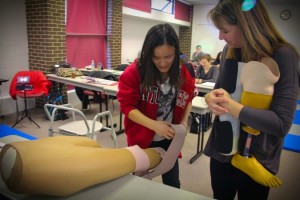Annie Reading draws on personal experience in working as an occupational therapy assistant
By Patti Verbanas/Rutgers Today
Annie Reading was never one to let a disability get in her way.
Born with syndactyly – a congenital condition in which the fingers or toes are webbed or joined – Reading became aware at an early age that she is a part of a population that is different in appearance and abilities.
“I’m missing a couple of fingers in my left hand, which can cause some problems with grasping – like when I pick up a cup,” she says. “Although I’m able to function well, it was difficult to accept that I was different physically while growing up.”
Her experience inspired Reading, who will earn her associate of science degree in the Occupational Therapy Assistant Program from Rutgers School of Health Related Professions and Raritan Valley Community College this month, to pursue a career helping others to learn how to cope with their differences.
Reading’s career direction started to take hold as a high school senior when she read a biography about a man who was born missing limbs.
“I was inspired by how he wrestled with his limitations and succeeded in finding a way to perform tasks the rest of us take for granted. I was especially struck by how his father adapted his toys,” she says. “I realized I wanted to do that same thing: Help people who are limited in some way work around their deficits.”
When she started researching programs, Reading says she didn’t know much about what occupational therapy assistants did “other than it was an altruistic field.” But when she learned about how these professionals work with occupational therapists to help individuals challenged by disability, trauma or the aging process to develop, recover and improve the skills needed for daily living, she knew she found her dream job.
The appeal and value of the profession were underscored recently when U.S. News and World Report ranked OTA as the No. 1 health support profession for 2016, while the U.S. Bureau of Labor Statistics expects a 40 percent increase in occupational therapy assistant jobs from 2014 to 2024.
Reading was accepted and attended Rutgers full-time after completing all pre-professional courses at the partner community college and earned an associate of science degree in 18 months.
She has found the program empowering. “We are taught that people are not defined by their limitations. For example, someone who experienced a stroke is not a ‘victim,’ but rather a human being who happened to have a serious medical condition,” she says. “That gave me a lot of pride since that’s how I always viewed myself: As someone not limited in any way.”
Reading says that having a disability has given her a stronger understanding of being limited in one’s own body, which allows her to be a more empathetic practitioner – something she has put into play in the academic fieldwork she completed for her degree. She uses the adaptations she learned in class to work around her disability, such as using a gait belt to help her transfer patients from a bed to a wheelchair. “Clients look at me as someone who knows what they’re going through and someone who is living a full life,” she says.
She appreciates occupational therapy’s highly personal aspects. “We really get into people’s lifestyles, what they do day to day, and creatively adapt methods to help them resume tasks,” she says. Recently, as part of her fieldwork rotation at a geriatric rehabilitation facility, she assisted a woman whose flexibility had become limited by a hip replacement and wanted to know how she could continue to clean her bathroom. “I instructed her on how she could use a long-handled sponge since she could not bend over,” Reading says.
“The fact that Annie has had to learn to adapt and advocate for herself makes her an exceptional OTA,” says instructor Jennifer George. “She comes from a place where she understands the struggles and people relate to her.”
George says that she has watched Reading grow in the program. “When she started, she was quiet and reserved, but as she learned what occupational therapy was, she started applying what she was learning to herself – and she may not even have known she was doing it,” she says. “She realized that there is no judgment in what we do.”
Now, Reading is poised to share the empowerment she learned with others and would like to continue working with older adults.
“Occupational therapy assistants play such a key role in people’s recovery process,” she says. “Getting stronger is just a small part. We are giving them their lives back.”


